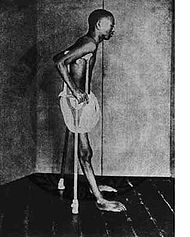
Beriberi
Background Information
This Wikipedia selection is available offline from SOS Children for distribution in the developing world. Child sponsorship helps children one by one http://www.sponsor-a-child.org.uk/.
| Beriberi | |
|---|---|
| Classification and external resources | |
 A sufferer - Turn of the 20th Century in southeast Asia |
|
| ICD- 10 | E 51.1 |
| ICD- 9 | 265.0 |
| DiseasesDB | 14107 |
| eMedicine | ped/229 med/221 |
| MeSH | D001602 |
Beriberi (pronounced Berry-berry) is a nervous system ailment caused by thiamine (vitamin B1) deficiency.
Etymology
The origin of the word is from a Sinhalese phrase meaning "I cannot, I cannot", the word being doubled for emphasis.
Causes
Beriberi is caused by a lack of thiamine (vitamin B1). It is common in people whose diet consists mainly of polished white rice, which is very low in thiamine because the thiamine-bearing husk has been removed. It is also seen in chronic alcoholics with an inadequate diet, as well as being a rare side effect of gastric bypass surgery. If a baby is mainly fed on the milk of a mother who suffers from thiamine deficiency then that child may develop beriberi as well.
The disease was often found in Asian countries (especially in the 19th century and before), due to those countries' reliance on white rice as a staple food. Beriberi is a nutritional disorder caused by deficiency of vitamin B characterized by damage to nerves and heart; general symptoms include loss of appetite and feeling of lassitude.
Symptoms and effects
Its symptoms include weight loss, emotional disturbances, impaired sensory perception ( Wernicke's encephalopathy), weakness and pain in the limbs, and periods of irregular heart rate. Edema (swelling of bodily tissues) is common. In advanced cases, the disease may cause heart failure and death. It may also increase the amount of lactic acid and pyruvic acid within the blood.
- Wet beriberi affects the heart; it is sometimes fatal, as it causes a combination of heart failure and weakening of the capillary walls, which causes the peripheral tissues to become edematous.
- Dry beriberi causes wasting and partial paralysis resulting from damaged peripheral nerves. It is also referred to as endemic neuritis.
Treatment
Treatment is with thiamine hydrochloride, either in tablet form or injection. A rapid and dramatic recovery within hours can be made when this is administered to patients with beriberi, and their health can be transformed within an hour of administration of the treatment. Thiamine occurs naturally in unrefined cereals and fresh foods, particularly fresh meat, legumes, green vegetables, fruit, and milk.
History
Christiaan Eijkman, a Dutch physician and pathologist, first demonstrated that beriberi is caused by poor diet. His work led to the discovery of vitamins. Together with Sir Frederick Hopkins, he was awarded the 1929 Nobel Prize for Physiology or Medicine for the discovery.
